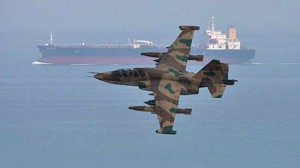Special to WorldTribune.com
WASHINGTON — The Iranian Air Force has surprised the U.S. military
with the interception of a Predator unmanned aerial vehicle, a report said.
The Washington Institute for Near East Policy asserted that the
interception of the U.S. Air Force MQ-1 Predator demonstrated the
effectiveness of Iranian combat pilots. In a report, the institute said two
Russian-origin Su-25 fighter-jets, which do not contain radar, succeeded in
detecting and tracking the Predator.

“All in all, the intercept over the Gulf demonstrated competent pilot
and controller skills and effective collaboration,” the report, titled “Iran Threatens Aerial Freedom of Navigation in the Gulf,” said.
The report, authored by analysts Eddie Boxx, Michael Eisenstadt, and
Michael Knights, disputed long-held U.S. military assessments that the
Iranian Air Force could not engage Western aircraft. The institute said the Iranian pilots were guided by controllers to within firing range of the Predator.
The Iranian Air Force operates 13 Su-25s, seven of them that fled Iraq
in the 1991 Gulf war. Unlike the U.S.-origin F-4, F-5 and F-14, the
short-range Su-25 Frogfoot was not designed as an interceptor.
“Its use against the Predator suggests that the operation may have been
initiated by the Islamic Revolutionary Guard Corps, which does not oversee
any air-to-air fighters — the Su-25 is its only high-performance aircraft,”
the report, dated Dec. 5, said. “This would also indicate the degree to
which the IRGC and the regular Air Force remain independent entities that do
not work well together.”
IRGC might have selected the Su-25 for its slow speed, which allowed the
aircraft to track the Predator. The report said a Western fighter-jet, such
as the F-16, would be too fast to track a UAV.
The report said the Iranian interception of the Predator marked a
watershed for Teheran’s military. One prospect was that other U.S. aircraft
would be targeted by the Iranian Air Force or other adversaries.
“Finally, as a last resort, Washington should consider giving Predator
drones a self-defense capability, and advertising this fact,” the report
said. “In addition, the administration should quietly signal to Teheran that
it reserves the right to strike Iranian airbases if the regime launches
offensive sorties, and that such retaliation would occur at a time and place
of Washington’s choosing.”

You must be logged in to post a comment Login